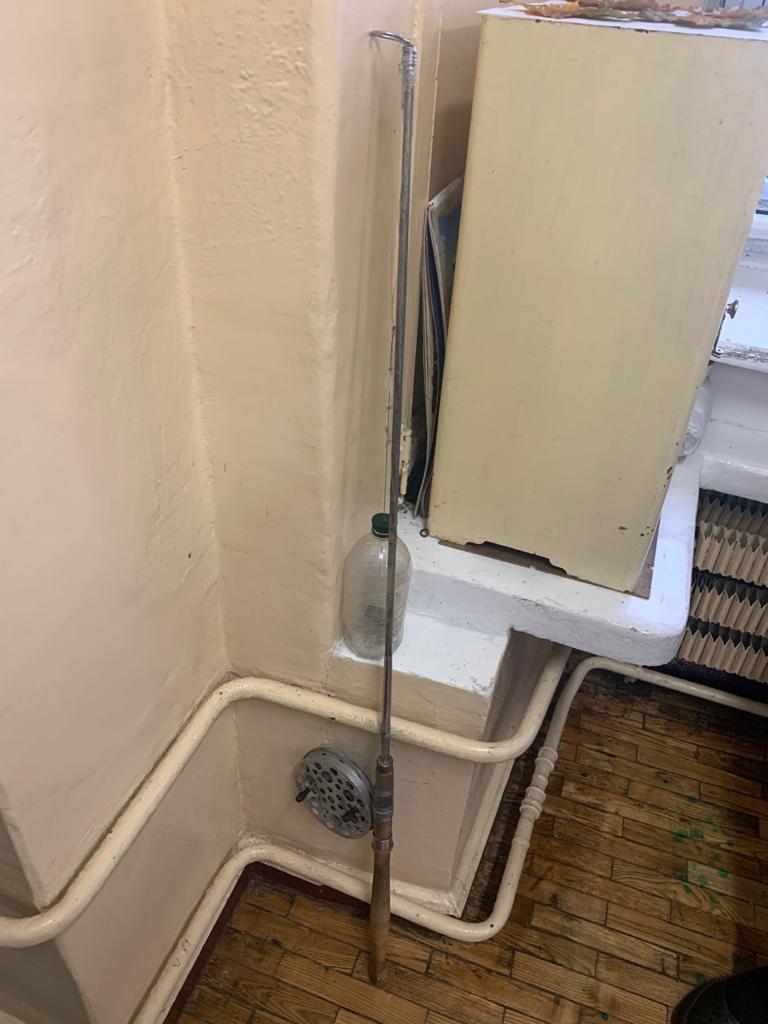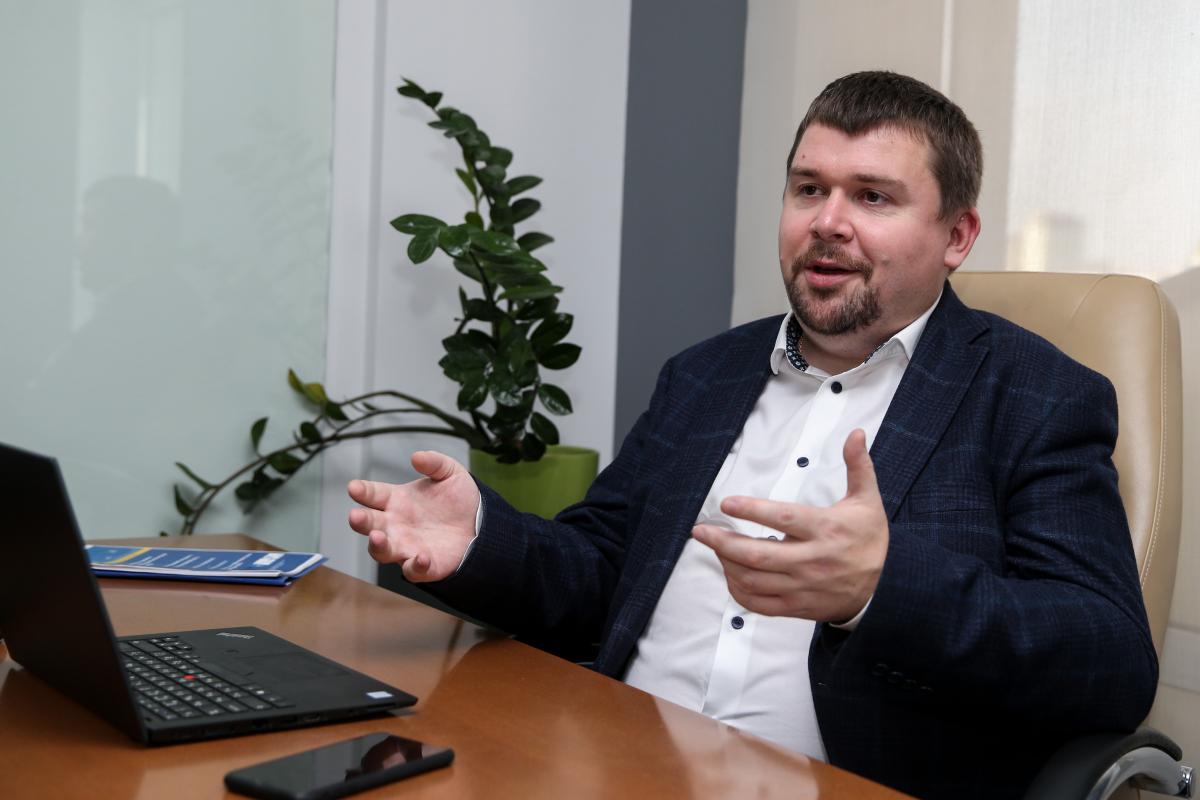
MP Artem Kovalev: The Dutch tell us about solar-powered vessels, while we show them the Dnieper locks in disrepair and a spinning rod as a "secret" locking technology...
Artem Kovalev, head of the subcommittee on river transport at the Parliament's Transport and Infrastructure Committee, ideologist and co-author of a high-profile bill on inland water transport, which is expected to revolutionize the national transport industry and tabled for a second reading on September 30, told UNIAN about the essence of the major reform and the critical state of the Ukrainian river infrastructure at the moment.
The Verkhovna Rada will soon vote on a new bill on water transport, which you co-authored. What's it about and why is it so significant?
This is a major sectoral bill. Today, it's priority legislation for Ukraine's transport industry.
The bill will cover and regulate all spheres regarding inland water transport: state regulation, functioning, infrastructure, transportation of goods and passengers, navigation and its safety, the liability of shipowners, and so on. Also, it is aimed at the implementation of the basic provisions of eight EU directives and two regulations in the field of water transport in accordance with the Ukraine-EU Association Agreement. In fact, with this bill, we harmonize Ukraine's legislation on water transport with that of the EU.
How long have you been working on the bill? When did you start?
We started developing it from the very beginning of our work in the Verkhovna Rada of the ninth convocation. That is, from September 2019. Over this period, we've already held more than thirty various events. These were round tables, conferences, and meetings with experts, market players, our Western partners, representatives of relevant committees and ministries, as well as legal experts – all those who are directly or indirectly engaged in water transport issues.
Why else is this law so complex? Well, it's because it lays at the intersection of interests of many industries. It's about transport, shipbuilding, energy, water resources, environmental watchdogs, police, border guards, port workers, farmers, steelmakers – all those who potentially seek to increase the volume of cargo transportation by river... Therefore, we held those meetings in order to take into account all the said interests, but at the same time to make the bill work and be effective in terms of regulating and stimulating the development of inland waterway transport and waterways as such.
How long has the industry been operating without a relevant law in place and why is its adoption so important today?
The issues of inland waterways navigation have never been legally regulated since Ukraine gained independence. Since then, there's been plenty of water under the bridge. The first attempts to pass the bill on inland waterway transport in one form or another came in 2009, that's almost 12 years ago. But due to the confrontation between various groups of influence and the political lobby, the move failed. The entire industry had no law to be governed with. So its absence and lack of government support could not contribute to the river transport development.
Therefore, today we're observing a collapsed river infrastructure, river locks in disrepair, a decrease in annual freight traffic to 12 million tonnes against 60 million tonnes in Soviet times.

Tell us about your work on the project. Whose experience did you study and where did you get insights?
We studied the experience of EU member states, met with our European colleagues. In particular, it was the Netherlands and Germany – both countries with some very developed navigation. For example, in the Netherlands, the seaport of Rotterdam, one of the world's largest, handles 500 million tonnes of cargo per year, while all thirteen Ukrainian seaports combined in 2019 handled only 160 million tonnes.
In the Netherlands, a fairly large share of water transportation is, in fact, private family business, where a family or just a group of people buys a ship by installments and then cargo is delivered from point "A" to point "B". Moreover, everything is very simple there. There's a program that shows ports of departure and ports of delivery to transport a certain cargo...
Just like Uber?
Yes, roughly speaking. Therefore, water logistics in the Netherlands is really streamlined and highly developed.
Obviously, we also have huge opportunities to increase the volume of cargo transportation by water. Our three rivers: the Dnieper, the Danube, and the Pivdennyi Buh are on the list of international waterways. But we still have a number of issues in place that hinder the development of this area, the main of which are the devastated infrastructure and the lack of the required cargo fleet.
Yes, please tell us about the state of our river infrastructure. How bad is it now, and what do you propose to change?
Its state is deplorable. All locks need major repairs. Today their wear is at 75%, and this is not only a matter of river logistics, but also of safety. It is necessary to repair locks throughout the Dnieper cascade and do strategic dredging.
Plus, we have to keep an eye on our information infrastructure – we are talking about modernization of navigation equipment, which, again, is directly related to the safety of navigation.
I'll tell you a showing story, which is both sad and funny. As part of the inspection of the Ukrainian river infrastructure, my Dutch colleagues and I visited the Kyiv lock. There, on the sixth floor of a dilapidated building with obsolete equipment dating back to 1960s, with no elevator available, somewhere near the exit door, a Dutch infrastructure ministry official spotted an old spinning rod with a plastic bottle tied to it. So he asked the senior lady, the gateway operator, what exactly was this rod about. As it turned out, with the help of such an unsophisticated device, the paperwork is delivered from vessels proceeding through the lock! What the operator does is she opens her window on the sixth floor, lowers a bottle tied to the line for the crew to put their paperwork in. So this is how they proceed through!

What is our river transport's potential?
All over the world, shipping by water is the cheapest and most environmentally friendly way of delivering goods.
In Ukraine, only 10% of the 4,000 kilometers of waterways are being used now. Less than 1% of all cargo is transported by river. For comparison, in the EU it's 7%. At the same time, the Danube and the Dnieper are among Europe's five largest rivers.
Compared to other modes of transport, whose throughput is limited, inland waterway transport has an undoubted advantage, namely the possibility of a significant increase in the volume of freight transportation and the possibility of transporting bulky cargoes. The Dnieper, the Danube, and the Dniester are defined by the European agreement the most important inland waterways of international importance.
Having analyzed the current situation, we conclude that the predicted volume of freight transportation along the Dnieper River, subject to the modernization of locks, has the potential to grow to the level of 45 million tonnes annually. This is 30 million tonnes of exports and 15 million tonnes of imports

As you said earlier, the water transport bill is at the intersection of the interests of many industries. Who resists the reform the most?
Most industries and businesses support the bill. But among the opponents are some players who are afraid of losing their monopoly position, while some are simply against clear rules and regulation – they feel comfortable amid the prevailing chaos in the industry.
Companies that are now holding a monopoly position on rivers, considering them their property, are least interested in the adoption of this bill. On the one hand, companies that have built major businesses and still survive in this industry even under the current conditions are doing a great job. But on the other hand, we understand that the absence of a law hinders the development of the entire market. Therefore, we are in favor of giving the opportunity to everyone willing to gain access to infrastructure.
If there is a market in place, accordingly, the cost of services will become competitive. Now the agrarians are forced to first bring their cargo to the silo, then wait until companies who own ships are able to transport it further along the river dictating their prices. What we want is to let these agrarians, roughly speaking, to be able to put their cargo from a grain truck directly to the ship. This will provide opportunities to develop not only to huge silos but also to small ones, as well as streamline logistics and reduce production costs.
What are the arguments of the bill's opponents?
Some argue that the law will kill shipbuilding – which, in fact, we don't have as such. Incidentally, we're also preparing a separate bill to stimulate it... We believe that even those foreign players who will come in if the law is passed, will over time also begin to build at Ukrainian capacities. That's because in our country, in view of the specifics of the locks and the cascade of reservoirs, the vessels, on the one hand, are limited in size, and on the other, they have a special design that allows them to remain stable in reservoirs, where waves could be as high as two meters and more. Therefore, from the point of view of economic effect, if a player comes to our market, being ready to play a long game, it is easier for them to build ships of the Ukrainian "Dnieper" design than to import self-propelled barges from, say, Danube and lose money, since in any case the efficiency and the load on Ukrainian vessels are higher than those on foreign analogs.
Other opponents of the bill argue that it allegedly could harm the environment. However, all over the world, transportation by water is the most environmentally friendly way of delivering goods, and by reorienting cargo from motorways, we will significantly reduce CO2 emissions. Also, by developing river infrastructure and doing dredging works, we will make our rivers clearer.
As for discharges from ships, we laid down in the bill the following norm: if a ship has a certified treatment system, it can discharge purified water into the river. If not, the crew shall only be allowed to discharge in the port for further processing. This is in line with international practice. It is prohibited to dump any contaminated water.
Another bizarre argument of our opponents is that opening up the water freight market for international companies would allegedly threaten national security. It's just ridiculous, nothing but speculation. We're not giving access to our inland waterways to the aggressor state – and this is clearly spelled out in the bill. Moreover, we clearly set out the requirements for the technical condition of vessels to be allowed to operate on our rivers, in order to exclude the possibility of obsolete "fish cans" being brought to our country.
Opponents also voiced a suggestion that with this bill we seek to legalize subsoil theft, that's sand, during dredging. This is also not the case. Over the years of Ukraine's independence, a situation has developed where, under the guise of dredging works, violators extract sand without the relevant permits.
Now dredging is a state function, and accordingly, colossal money is spent on it from the state budget. At the same time, this money is spent extremely inefficiently: for example, a state-owned company spends an average of UAH 150 to raise a cubic meter of soil during dredging, while a private operator is ready to do the same work for UAH 55-60, that's the government's price tag is thrice as high.
With the help of the law, we seek to change the concept of dredging works and apply a formula where, say, the river is divided into sections, and companies, be they public or private, compete at biddings for the right to manage a specific section, where they undertake to maintain the required parameters of the navigable course and guarantee required depths in line with the developed project. This means it will be open biddings where the winner is the one who offers the state the lowest price for their services.
Part of the soil extracted during dredging will be used to strengthen the passage. Also, the company will be able to sell the surplus, having received a special permit from the State Geological Agency, and all volumes sold will be transparent and controlled. And when the state pays the company for its dredging services, this will be the amount contracted at the auction minus proceeds from the surplus soil sold by the company. This concept will save money in dredging works and allow to at least somehow track the soil that's being extracted. Moreover, if the company overdoes or underperforms in dredging, huge fines will ensue, along with contract termination.
We've been hearing these boogeyman stories about the fate of our shipbuilding, discharge, threats to national security, and illegal extraction for 12 years already, while the industry just continued to decline. People can argue for a long time over each letter in the text but I believe that the bill needs to be adopted and that the industry, which is in now a critical state, should be relaunched. After all, if businesses – market participants – face any difficulties, the law can be any time amended. However, the industry needs to work.
Otherwise – we're bound to observe this horrible difference we're seeing now – when the Dutch tell us on our trips about solar-powered ships, while we show them locks in disrepair and "secret technologies" with spinning rods...
Moreover, we have provided for a transition period of three years for many of our initiatives.
What economic effect do you expect to see from the bill's implementation, and when?
The adoption of this law is the start of river transport reform. This is the development of freight and passenger traffic on rivers, guarantees of the proper maintenance of the river infrastructure, guarantees of equal access for all operators. We want to stimulate the creation of an open and competitive water transport market.
If we speak about indicators, this will allow us in the next three-four years to increase freight river transportation to 30 million tonnes per year with a direct economic effect for the state at UAH 13-16 billion (US$460-566 million). In turn, this will allow for the development of related areas and businesses with a direct economic effect of UAH 17-18 billion per year.
The adoption of the bill will create up to 10,000 new jobs in the industry, increase budget revenues. In addition, it will create the necessary conditions for private investment in construction and repair of river ports.
Moreover, the bill will stimulate the development of shipbuilding with the attraction of Ukrainian and foreign investment,
Will the cost of river logistics increase for businesses?
It won't. The bill provides for the abolition of a number of fees for carriers. The following will be canceled: fees for proceeding through locks, fees for special water use (there will be a separate law on amendments to the Tax Code), and fees for opening bridge spans. Moreover, for inland navigation vessels, a number of discounts are provided on port dues in seaports.
Everything you have described will require significant investment in river infrastructure. Where are we supposed to get the money?
For the effective maintenance of river infrastructure, funding should amount to UAH 760 million per year. This amount includes ensuring the functioning of the navigation locks of the Dnieper cascade, works to maintain navigable dimensions on river routes, the functioning of the River Information Service, and navigational and hydrographic support of navigation on river routes.
Due to the systematic underfunding of the industry, a dangerous situation with locks has developed, the strategic river infrastructure has been almost completely ruined, while the length of inland waterways has decreased significantly. For example, this year, UAH 140 million was initially laid down for the repair of locks, but the amount was later reduced to UAH 40 million.
The bill provides for a stable financing mechanism not only for the river infrastructure maintenance, but also for capital investment and modernization.
What's it about?
We want to create a State Fund for Inland Waterways Development. Its ideology is to have payments to the budget made on the river go to river development. Accordingly, the Fund will be filled from three main sources.
First, this is 1% of the excise tax on fuel produced in Ukraine and excise tax on fuel imported into the customs territory of Ukraine. That's approximately how much fuel is currently consumed by river transport of the total volume. It's 1%. So everything is fair.
Secondly, 3% per month from customs payments paid when ships are put into the "temporary import" customs regime. It is paid for ships intended to be operated under a foreign flag on our inland waterways – by the way, this norm additionally protects national shipowners.
And thirdly, it's 45% of the rent for the special use of water for the needs of hydropower generation. This norm will cover part of the cost of maintaining the locks without increasing tariffs for electricity generated by HPPs.
You mentioned the issue of allowing access to Ukrainian inland waters for ships flying a foreign flag. Will Ukrainian ships get access to foreign rivers, too?
Now foreign ships are allowed to enter our inland waterways after receiving a one-time permit. There is a corruption factor here. Ships flying a foreign flag cannot work permanently in cabotage mode, they have to deal with obtaining these permits all the time, and we all know how some permits are issued... With our bill, we want to liberalize the river transport market and open it to all players.
For example, according to EU legislation, only ships flying the flag of EU member states can operate on their inland waterways. Therefore, they are still closed for us. But with our law, we are taking the first step by harmonizing our legislation with that of the EU. As soon as Ukraine joins the EU, ships flying the Ukrainian flag will be able to operate there, too.
Will ships flying Ukrainian and foreign flags operate on equal terms? After all, foreigners will be able to not pay part of the taxes...
Yes, at first glance, it may seem that foreign ship owners will bear a significantly lower fiscal burden and not pay single social contribution, income tax for individuals, military duty, and income tax. But don't forget that the owners of will still bear tax obligations in the country of their vessel's registration.
Moreover, foreign shipowners, unlike Ukrainian ones, must pay a repatriation tax of 6% of the freight and a significantly higher rate for pilotage services to the Ukrainian budget, while the resident charterer pays VAT for foreign ships.
Also, any fiscal advantages are balanced out, given the need for foreigners to pay customs duties for the temporary import of their ships into the customs territory of Ukraine. As I already said, such a fee is 3% per month of the amount of payments for customs clearance of the vessel, while money from those payments are set to be sent to a special fund for the development of Ukraine's inland waterways.
Foreign ships will also pay excise tax on fuel. Such conditions allow Ukrainian ships to remain in an even more advantageous position.

Obviously, the development of water transport will significantly relieve the burden on roads and railways. Accordingly, won't your bill deal a blow to road and rail carriers?
Why are all cargoes most actively transported by road now? Because, on the one hand, buying a truck is much cheaper than buying a barge, building a terminal or a silo. But, on the other hand, we understand that now transport is profitable only for one reason: trucks drive on our roads with significant overload. But if these carriers are forced to ship goods by the rules, profitability of national road transportation will drop dramatically.
Taking into account the fact that the Great Construction Project is currently underway in Ukraine, more weighing stations will appear on our roads, while the fines for truck overload have already increased – we will reach the point where overloading vehicles will become unprofitable. In other words, transporting the same volume of goods will simply require more trucks or shifts. So no one will stand idle, but the river will grab the excess of these cargoes.
On the other hand, by reorienting bulky cargoes to the river, we will significantly relieve our roads. For example, two barges replace 250 trucks. And, as a result, we will save significantly on road repairs – some 1 million tonnes of cargo transported by river will save UAH 1 billion on road repairs over four years.
If we talk about rail transportation, many understand that, on the one hand, tariffs there are now actually understated for certain players. On the other hand, go try, as an outsider, to find free rail cars and locomotives to transport your cargo...
Yes, all cargo owners complain about the lack of locomotives and rail cars in Ukraine ...
… Therefore, I don't think that the development of river transport will deal a blow on other carriers. This will enable businesses to get cheaper logistics. The development of river logistics will also significantly improve the environmental situation.
After the first reading, more than a thousand amendments were made to the text of the bill. Is it because the original text was imperfect, or what?
I would divide the amendments to this bill into three types. The first ones are really the ones that improved the bill or simply had an alternative point of view.
The second group of amendments is purely technical amendments, which sometimes didn't even relate to the nature of the bill.
And the third one is indeed the amendments that the businesses requested in terms of stimulating the development of the industry. These are the amendments proposing either to simplify bureaucratic procedures, or to regulate them, or not to introduce any procedures that would complicate the work during the implementation of the new law.
What changes have you made to the text in-between the two readings?
In April, we passed the bill at first reading, and since then we have substantially revised it, taking into account about 90% of the amendments and comments submitted by businesses, MPs, and ministries.
For example, we have provided free registration of ship's logs instead of having them issued. The procedure for maintaining the register of infrastructure facilities, for its greater transparency, was outlined in accordance with Law On the Licensing System in the Field of Economic Activity. Licensing will remain only for passenger transport and hazardous cargoes. Also, we introduced a special permit for the sale of soil extracted during dredging. We provided for the possibility of discharging wastewater from ships only after treatment and disinfection, excluded the possibility of financing the inland water transport infrastructure at the expense of port dues. River ports will be allowed to provide services to ships with a maximum draft of more than 4.5 meters – but on condition that they've paid the stipulated fees at the nearest seaport. And so on and so forth...
I believe that the final version of the bill is the best version of all previously developed documents.
Does the bill introduce new registers and permits?
The introduction of new registers and procedures in the draft law is due to the need to implement EU directives and regulations in accordance with the Association Agreement. We are not introducing any other kinds of new permits.
In your opinion, will there be enough votes in the session hall to pass the bill?
Between the first and second readings, we did a lot of work. The law is balanced and well-weighed. It is clear that we can try to improve the text for the next 12 years, while the entire industry will have no opportunities to develop, declining even more over the years ... Therefore, the proposal is very simple – to vote the bill in. Moreover, we have foreseen a transition period for many norms, up to three years for some. If someone needs to correct or change something, there will be time for this.
Taking into account the fact that on many points we reached a compromise – not to the detriment of the law, but in order to further stimulate businesses to invest money in this area – I think that there will be enough votes. We had a consolidated unanimous opinion when voting on amendments at the Committee.
I believe that the majority of People's Deputies are pro-creation, not pro-destruction. And I am very grateful to all other co-authors, the head and members of the Committee on Transport and Infrastructure, the Ministry of Infrastructure, especially the reform support team, as well as MPs from different parties and committees, all ministries, experts, the EU project "Promoting transportation development of the Dnieper River" for drafting the text the bill.
Have any of the foreign players already expressed their readiness to invest?
They have, yes. For example, European companies are ready to enter our cabotage services market, work within the country, build and invest. Ukrainian players are also showing interest, but everyone needs clear rules and confidence in the government's will to develop the industry.
If the bill is adopted, what further steps should Ukraine take to implement it?
The Water Transport Bill is the first step in the reform. The second bill, which we have already registered, is on the creation of the State Fund for Waterways Development, which is a very important component of the first law. However, since it involves amendments to the Budget Code, this must be a separate document. In any case, the government is already starting to develop many bylaws, and I think the first batch of them will be adopted starting next year.
Nadiia Burbela

